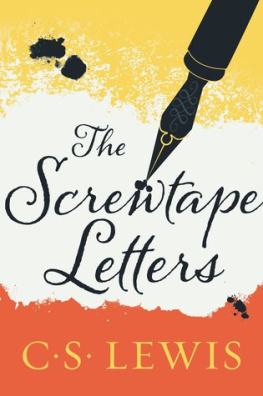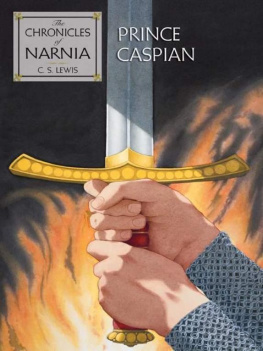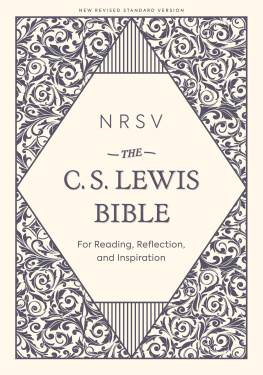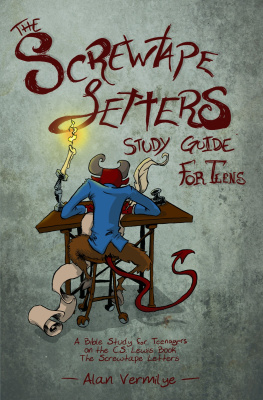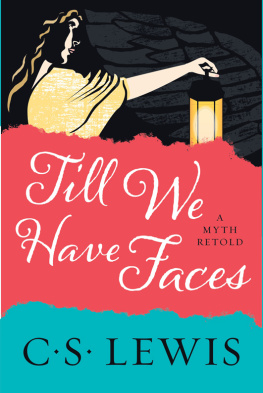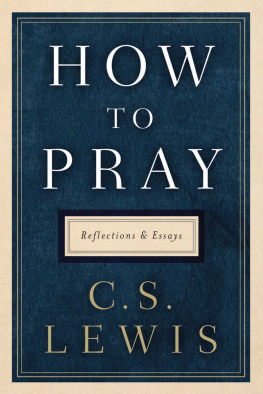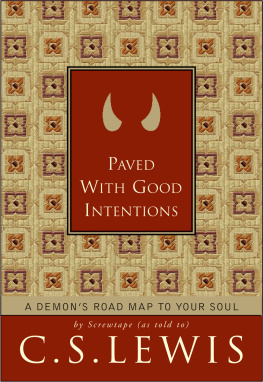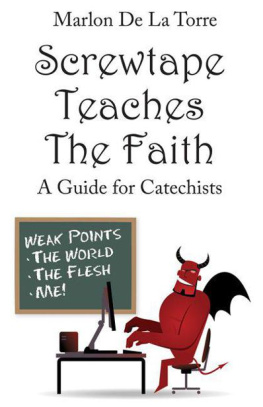C. S. Lewis - The Screwtape Letters
Here you can read online C. S. Lewis - The Screwtape Letters full text of the book (entire story) in english for free. Download pdf and epub, get meaning, cover and reviews about this ebook. year: 2001, genre: Art. Description of the work, (preface) as well as reviews are available. Best literature library LitArk.com created for fans of good reading and offers a wide selection of genres:
Romance novel
Science fiction
Adventure
Detective
Science
History
Home and family
Prose
Art
Politics
Computer
Non-fiction
Religion
Business
Children
Humor
Choose a favorite category and find really read worthwhile books. Enjoy immersion in the world of imagination, feel the emotions of the characters or learn something new for yourself, make an fascinating discovery.
The Screwtape Letters: summary, description and annotation
We offer to read an annotation, description, summary or preface (depends on what the author of the book "The Screwtape Letters" wrote himself). If you haven't found the necessary information about the book — write in the comments, we will try to find it.
The Screwtape Letters — read online for free the complete book (whole text) full work
Below is the text of the book, divided by pages. System saving the place of the last page read, allows you to conveniently read the book "The Screwtape Letters" online for free, without having to search again every time where you left off. Put a bookmark, and you can go to the page where you finished reading at any time.
Font size:
Interval:
Bookmark:

Copyright 2014 epubBooks
All Rights Reserved.
This publication is protected by copyright. By payment of the required fees, you have been granted the non-exclusive, non-transferable right to access and read the text of this ebook on-screen or via personal text-to-speech computer systems. No part of this text may be reproduced, transmitted, downloaded, decompiled, reverse engineered, stored in or introduced into any information storage and retrieval system, in any form or by any means, whether electronic or mechanical, now known or hereinafter invented, without the express written permission of epubBooks.
www.epubbooks.comTo
J. R. R. Tolkien
"The best way to drive out the devil, if he will not yield to texts ofScripture, is to jeer and flout him, for he cannot bear scorn." Luther
"The devill .. the prowde spirite .. cannot endure to bemocked." Thomas More
I have no intention of explaining how the correspondence which I nowoffer to the public fell into my hands.
There are two equal and opposite errors into which our race can fallabout the devils. One is to disbelieve in their existence. The other isto believe, and to feel an excessive and unhealthy interest in them. Theythemselves are equally pleased by both errors and hail a materialist or amagician with the same delight. The sort of script which is used in thisbook can be very easily obtained by anyone who has once learned theknack; but illdisposed or excitable people who might make a bad use ofit shall not learn it from me.
Readers are advised to remember that the devil is a liar. Not everythingthat Screwtape says should be assumed to be true even from his own angle.I have made no attempt to identify any of the human beings mentioned inthe letters; but I think it very unlikely that the portraits, say, of Fr.Spike or the patient's mother, are wholly just. There is wishful thinkingin Hell as well as on Earth.
In conclusion, I ought to add that no effort has been made to clear upthe chronology of the letters. Number XVII appears to have been composedbefore rationing became serious; but in general the diabolical method ofdating seems to bear no relation to terrestrial time and I have notattempted to reproduce it. The history of the European War, except in sofar as it happens now and then to impinge upon the spiritual condition ofone human being, was obviously of no interest to Screwtape.
| C. S. LEWIS |
| MAGDALEN COLLEGE |
| July 5, 1941 |
My dear Wormwood,
I note what you say about guiding your patient's reading and taking carethat he sees a good deal of his materialist friend. But are you not beinga trifle naf ? It sounds as if you supposed that argument was the wayto keep him out of the Enemy's clutches. That might have been so if hehad lived a few centuries earlier. At that time the humans still knewpretty well when a thing was proved and when it was not; and if it wasproved they really believed it. They still connected thinking with doingand were prepared to alter their way of life as the result of a chain ofreasoning. But what with the weekly press and other such weapons we havelargely altered that. Your man has been accustomed, ever since he was aboy, to have a dozen incompatible philosophies dancing about togetherinside his head. He doesn't think of doctrines as primarily "true" or"false", but as "academic" or "practical", "outworn" or "contemporary","conventional" or "ruthless". Jargon, not argument, is your best ally inkeeping him from the Church. Don't waste time trying to make him thinkthat materialism is true ! Make him think it is strong, or stark, orcourageousthat it is the philosophy of the future. That's the sort ofthing he cares about.
The trouble about argument is that it moves the whole struggle onto theEnemy's own ground. He can argue too; whereas in really practicalpropaganda of the kind I am suggesting He has been shown for centuries tobe greatly the inferior of Our Father Below. By the very act of arguing,you awake the patient's reason; and once it is awake, who can foresee theresult? Even if a particular train of thought can be twisted so as to endin our favour, you will find that you have been strengthening in yourpatient the fatal habit of attending to universal issues and withdrawinghis attention from the stream of immediate sense experiences. Yourbusiness is to fix his attention on the stream. Teach him to call it"real life" and don't let him ask what he means by "real".
Remember, he is not, like you, a pure spirit. Never having been a human(Oh that abominable advantage of the Enemy's!) you don't realise howenslaved they are to the pressure of the ordinary. I once had a patient,a sound atheist, who used to read in the British Museum. One day, as hesat reading, I saw a train of thought in his mind beginning to go thewrong way. The Enemy, of course, was at his elbow in a moment. Before Iknew where I was I saw my twenty years' work beginning to totter. If Ihad lost my head and begun to attempt a defence by argument I should havebeen undone. But I was not such a fool. I struck instantly at the part ofthe man which I had best under my control and suggested that it was justabout time he had some lunch. The Enemy presumably made thecountersuggestion (you know how one can never quite overhear what Hesays to them?) that this was more important than lunch. At least I thinkthat must have been His line for when I said "Quite. In fact much too important to tackle at the end of a morning", the patient brightened upconsiderably; and by the time I had added "Much better come back afterlunch and go into it with a fresh mind", he was already half way to thedoor. Once he was in the street the battle was won. I showed him anewsboy shouting the midday paper, and a No. 73 bus going past, andbefore he reached the bottom of the steps I had got into him anunalterable conviction that, whatever odd ideas might come into a man'shead when he was shut up alone with his books, a healthy dose of "reallife" (by which he meant the bus and the newsboy) was enough to show himthat all "that sort of thing" just couldn't be true. He knew he'd had anarrow escape and in later years was fond of talking about "thatinarticulate sense for actuality which is our ultimate safeguard againstthe aberrations of mere logic". He is now safe in Our Father's house.
You begin to see the point? Thanks to processes which we set at work inthem centuries ago, they find it all but impossible to believe in theunfamiliar while the familiar is before their eyes. Keep pressing home onhim the ordinariness of things. Above all, do not attempt to usescience (I mean, the real sciences) as a defence against Christianity.They will positively encourage him to think about realities he can'ttouch and see. There have been sad cases among the modern physicists. Ifhe must dabble in science, keep him on economics and sociology; don't lethim get away from that invaluable "real life". But the best of all is tolet him read no science but to give him a grand general idea that heknows it all and that everything he happens to have picked up in casualtalk and reading is "the results of modern investigation". Do rememberyou are there to fuddle him. From the way some of you young fiends talk,anyone would suppose it was our job to teach !
| Your affectionate uncle |
| Screwtape |
My dear Wormwood,
Font size:
Interval:
Bookmark:
Similar books «The Screwtape Letters»
Look at similar books to The Screwtape Letters. We have selected literature similar in name and meaning in the hope of providing readers with more options to find new, interesting, not yet read works.
Discussion, reviews of the book The Screwtape Letters and just readers' own opinions. Leave your comments, write what you think about the work, its meaning or the main characters. Specify what exactly you liked and what you didn't like, and why you think so.

